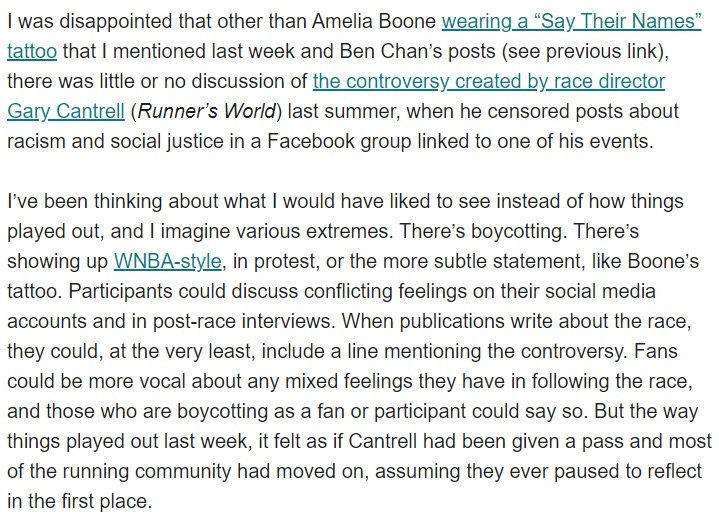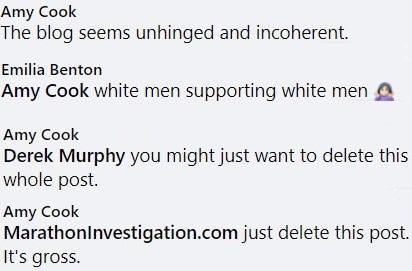Infiltrating the Runner's World "Join the Movement" issue (IV)
A few thoughts on “credible outlets” from an incomprehensible, know-nothing blogger
While neither a naturally endowed nor a governmentally assured right, access to reliable information beyond what each of us can see and hear for ourselves is an ostensibly valuable commodity. Being able to trust the media’s—or any observer’s—reporting on a given event or feature of society, be it the Tea Party, triathlon or tiddlywinks, goes a long way toward feeling a genuine part of that real or symbolic enterprise. Does anyone enjoy being part of a family whose members keep important secrets from each other?
You clearly don’t want to see damaging misinformation spread within a given realm about operators and principles you support. But if you’re a person of integrity, it bothers you just as much—maybe not in your gut, maybe not even in your heart, but at least in some part of your conscience—even when such damaging misinformation favors your own interests, e.g., the attempted whitewashing of spousal abuse of “our guy” in a political campaign, or the spreading of unfounded rumors of the same conduct about “their guy” in the campaign.
Last October, Derek Murphy of MarathonInvestigation.com linked from his Facebook group page to one of my articles about Outside Online’s collaboration with a random Internet feeb to try to ruin the reputation of race director Gary “Laz Lake” Cantrell—a systematic and openly dishonest effort amplified to varying degrees by Runner’s World, Fast Women, Citius Mag and Women’s Running. Cantrell’s crime, of course, was refusing to change his policy of allowing any political chatter on his page; his privately affirming agreement with Ben Chan’s position on Black Lives Matter proved insufficient in the age of manic Wokish absolutism, and the result was a cascade of absurd flailing fomented by these outlets over the trouble Cantrell had supposedly caused.
Take a moment to consider the sum of these machinations. Simply because someone identifying himself as a political ally didn’t want his own Facebook page to become a free-for-all, Chan and Outside conspired to make that person—who raised close to $300,000 for charity in the virtual ultra that gained him all this opprobrium—a target of punishment, with the self-appointed voices of running suggesting he should be ousted from the sport altogether. No second chances even for crimes uncommitted in this world!
Unless I have misrepresented this picture somehow, by commission or omission, then it’s hard to conclude that the people involved in the dragging of Gary Cantrell aren’t foul human beings. There is no good in, or even sought in, these sorts of gutless, thrashing examples of “mob justice,” all underwritten by publications and sites that anticipate soaring profits via this model.
Anti-white racist victims of self-emasculation such Chan, who seek to arbitrate who can say what and where and propose extreme penalties for any dissent whatsoever, are now found as abundantly on the Wokish left as they are on the anti-porn, “family values” Christian right. Here’s Alison Wade’s own recipe for Butthurt Stew, a New England favorite perfect for maximizing rage and propagating the specter of -isms as the underlying cause of all problems: Invent an enemy and mix in some crimes, then salivate endlessly over various punishments.
The same publications, along with an assist from op-eds in the general mass media such as the New York Times and the Washington Post, have been bad actors in other ways. By declaring Caster Semenya’s prohibition from certain events a consequence of bigotry alone, and without even disclosing the crux of the opposing argument against including intersex athletes in women’s sports (i.e., that Semenya’s testosterone is “naturally elevated” for a woman for the same reason mine is), these outlets purposefully fueled a misunderstanding on the part of the reading public, which was led to believe that the high testosterone levels seen in Semenya and other intersex women were an anomaly no physiologically different than extreme height.
All of this was in the service of the Wokish concept of “equality”: To hell with whatever biological women, their parents, science, and the athletic world in general have to say on the matter; this is what you will all agree to or we, together, will burn you.
This is irresponsible journalism on a serious scale, not the outcome of a couple of well-intended whoopsies. It is exactly why liberals learned to hate Fox News over a long period before MSNBC and CNN decided to join the financial bonanza in full and offer a nonstop, cheerlessly dishonest stimulant-narcotic instead of anything resembling news. And the reason it’s profitable lies in its diabolical appeal to human nature: It unifies. These days, most people would rather climb aboard a flaming rickshaw filled with pilgrims and headed straight for downtown Hell than be stranded alone with a handful of eminently sane and defensible—yet somehow not just contrary, but completely off-limits—opinions.
I’ll also mention that Runner’s World choosing an established harassment-happy influencer to grace its anti-harassment cover wound up more or less as fate predicted, although it’s unclear whether either party will really suffer given that neither is really aiming at the middle of the regular running community.
Finally, Women's Running promoting anti-women's-running activist Alison “Whiteness ruins everything” Désir just doesn’t seem like it will turn out well for women’s running. I’ve looked at this strategy from every angle and I keep getting steered inexorably toward not good for girls’ and women’s running.
You’ve seen all of these complaints before, most of them repeatedly. But revisiting them now isn’t a digression. Getting back to the Marathon Investigation Facebook thread, if you don’t have access to Facebook, as any decent person does not, know that a dozen or so commenters expressed some combination at being unable to wade through all of the rambling prose and knowing that it was terrible anyway based strictly on the gender, age and ethnic identities of the critic and his targets.
Importantly, the notion of “credible outlets” was brought up. Here, this was an excuse to disregard something based solely on where it appeared, no matter how compelling—or not—its arguments may have been. That the critic wanted those “present” to be aware of her own status as a writer, in particular for Runner’s World, was evidently meant to convey the idea that since her work bore the imprimatur of a known, paying publishing entity, she had the authority on that basis alone to hand-wave a peon blogger’s corrupt input.
It’s possible Ms. Benton failed to account for all of the variables in her analysis, but in any case, however insubstantial anyone’s writing in the area of distance running may be in the grand literary or journalistic scheme, it seems relevant that dozens of articles bearing my byline with publication dates between 1999 and 2020 occupy the Runner’s World site. I have somehow managed to impress a great many editors and maintain long working relationships with them, including some of the same editors Ms. Benton has impressed, despite my galactic inability to communicate ideas in my native language. Again, if her point is that no good writer wastes their time submitting content to the fitness industry, I will freely concede this while reminding Ms. Benton that she occupies precisely the same niche and brags about it. Something seemingly has to give in the idea that my writing is simply too ugly to even be looked at while hers isn’t, unless she’s suggesting that anything on a nonpaying (or reader-supported) site can be dismissed on principle.
Either way, it seems that Ms. Benton has invited both a review of her work and a determination of whether Runner’s World and other publications at the forefront “the running conversation” can be considered credible. The latter question being the only important one, I’ll try to answer that based on criteria reasonable people should be prepared to accept.
If a writer makes an honest mistake that makes it into digital or literal print, that doesn’t, or shouldn’t, spell the end of that writer’s or outlet’s credibility. If it happens repeatedly, well, that suggests sloppiness, depending on the nature and scale of the errors. If repeated mistakes by the same writer or the same outlet combine to form a clear pattern, then either general incompetence or willful editorial slanting is to blame. I believe the latter to be less forgivable, but either way, if a significant percentage of a publication’s key messages is demonstrably false or misleading, then the publication can be dismissed as “not credible.”
Leaving aside the training-related content the aforementioned outlets continue to produce, when it comes to anything pertaining to culture and society, they are all as credible nowadays as the nearest psychic is, and work on the same principle: They’re telling their new target audience what it wants to hear, even if it’s both upsetting on balance and pulled from thin air. Their entire mission is to seduce and inflame rather than inform, just like every other media outlet trying to stay in the black. They may succeed in this, but they are failing their journalistic mission, the only one they supposedly signed up for, with flying colors.
As for Ms. Benton, she and another distressed individual—both of whom presumably signed up voluntarily for the group—had more to add in the Facebook thread.
Absent these helpful advisories and specific criticisms of my article, this is an indirect admission that a blind refusal to treat my opinion as worthwhile based on my ethnicity—that is, bigotry—is what’s really fueling the disgust here. This doesn't mean that they’re necessarily wrong about me being a bad person who writes poorly; it just means that this consideration is relegated to irrelevance by the admission of a conclusion drawn in advance. White men. You know their kind.
But this—this unabashed attempt to just shut down the spread of ideas through insults and coercion—burns my ass more than any desultory barbs about my purported use of a thesaurus and my self-satisfied preening. And it’s not about, or only very slightly about, the limitation of my ideas. Would you want any one person being in charge of deciding what you get to read? Anyone on Earth, let alone someone like me or Ms. Cook here?
A comment from the older-white-male faction, being both scatological and barely intelligible yet piling on in the appropriate way, serves as independent confirmation that the others’ dyspepsia isn’t actually about what’s less-than-felicitous prose or “gross.”
Bear in mind, too, that people who follow Marathon Investigation are in theory interested in catching and punishing cheaters of all sorts. The article they were complaining about dealt largely with cheating in the running world, which is why Murphy posted it on his group page. What kinds of cheater-busting and integrity-policing are they prepared to support? The kind that applies only to imaginary affronts such as Cantrell’s?
Despite Ms. Benton’s nominally running-related pieces being mostly about culture wars, her writing is colorless, rising to the level of, at best, doggedly capable. It is indistinguishable from hundreds of others who can use Google and have discovered jogging. But while we* can litigate what is and isn’t good writing until the cows come home (which will happen after Hell freezes over and people stop using clichés like they’re going out of style), we* can be more decisive about whether someone’s writing is useful: Original, exposing a fresh view of an athlete or product or training tip not available elsewhere, or plumbing a topic germane to the subject that no one else has satisfactorily attempted. Or just honest.
Her article about Cantrell isn’t the hit piece Martin Fritz Huber’s is, but it still unfairly makes him the centerpiece of an American race war, with his refusal to change his social-media rules somehow tied to the insults participants in Cantrell’s virtual race say they experienced all over the country. Although this is nuts, I’m guessing Ms. Benton fully believes it. She and the other Wokesters and Wokestresses scrambling to blame the world’s problems, including their own ignorance, on white people have the momentum of hundreds of thousands of aggrieved whiners behind them.
On the running side, she, a 3:45-ish marathoner, even has a “less is more” article. No such piece in history has ever been credible after all of the reasons for the “less” are fully unpacked.
I tried to find one thing Ms. Benton has contributed to the running canon that no one else already has or could have, or a reason anyone should listen to a garden-variety midpacker in the first place. I could not, even in credible outlets such as SELF and Prevention. She’s fairly young, so maybe this can change as she actually figures the sport out. But she writes mostly for online content mills about topics other than running, having settled for some reason on vaginal and other gynecological pathologies as something of an area of specialty, with examples including “So, Um, Why Is My Discharge Brown?”; “The 7 Best Period Panties You Can Buy — And How to Take Care of Them”; “Why Do My Nipples Hurt?!” I’m sure some of this information is vital, but I bet it can be found in a dozen other places.
Even if it's true that I can't or won’t write in a way most people can grasp, someone will have to show that I have written less trustworthy material than anything I have criticized here lately. Or that I’ve made any real mistakes other than grappling with this stuff to begin with, a task the censorship brigade helps me keep focused on when ennui and the call of other projects start chiseling away at my motivation.
I will grant my critics the trivially obvious point that some blogging is in fact not journalism and is plainly not meant to be. It’s not usually hard to tell the difference. But leaving aside the fact that Substack differs importantly from traditional blogging platforms, does this mean that anything written on a blog is automatically not credible?
Forwarding this silly claim makes it easier to defend its functional converse: That if something appears in a certain sort of publication—say, one that pays freelancers and exists or at some point existed in print—then it’s automatically credible.
Runner’s World, apart from its recent dives into antiracist antics, long ago lost much its credibility, although promoting ineffective training and gimmickry seems less damaging than promoting racism and slander. The fact that this was published underscores that. I'll take the $300 I was paid for that crapburst, but it was basically an excuse to get my buddy's name into an article and "debate" whether a scam works or not. I couldn’t even get my usual physiologist contact to chime in on the effectiveness of the scam because he thought the core claims were too silly to criticize, like I had asked him if the thing about broken mirrors and seven years of bad luck was true.
I invite Ms. Benton and others to read the facts in these posts—and they’re facts, even if they’re on a bumbling little bloglike assembly—and then defend the idea that Runner’s World is, at this point in publishing history, more reputable just because it happens to have paid her a little grocery money. They can also review what I’ve done in running outside of this warm and fuzzy Substack project and decide if the totality resembles an effort to make running better, or whether it seems intent on dragging it down by way of somehow elevating myself.
Also, while this will be unpopular, I think it’s fair to start responding to the normalization of “old white men,” “cis white men,” and so on—as if such warbling now conforms to AP style—with descriptors such “unhappy fat women,” since this equally helpful in engaging a broad audience and carries more explanatory power.
Not really. That this is somewhere between patently hostile at the benign end and misogynistic at the other isn’t even the point; it’s that this gambit completely shuts down whole conversations by declaring someone’s input either biased or invalid based on things they can’t change about who they are. The fact that history, both world and American, favors the reign of the literally barbaric or privileged white male—it undeniably does, and, ambient zeitgeists notwithstanding, neoliberalism is making this worse, not better—doesn’t mean that people are going to keep backing away and accommodating being cast into a group bin, oppressor or oppressed, no matter what their individual circumstances and ideas are.
Will any of these change with Outside’s acquisition by Pocket Outdoor Media? I think not. Perhaps freelancers will be paid in a timely fashion, but for what? The running pubs have committed to the Wokester course they are on and will either run into icebergs of nonviability within a few years or shift their focus to whatever cultural-political phenomenon sees most irresistible to readers.
The fact is, certain forms of emotionally laden garbage will always be popular even when readers can see that it’s nothing more than poo-flinging performative art. Lindsay Gibbs is a perfect example, someone who runs one of the most popular sports-oriented Substack sites despite being a complaining know-nothing who blames everything on -isms, a noisemaking hack who would have no audience of so many women didn’t hate themselves. Like most who advertise themselves as “no bullshit,” Gibbs makes bullshitting the very foundation of her efforts. You’d think most people, especially active ones, would reject continually being told how weak they are and how their hurt feelings are someone else’s fault. But Gibbs is making a lot of money using the same essential model Rupert Murdoch and Jeff Zucker do: Keep them angry with what they do-don’t want to hear. And there are a lot more fat, unhappy females of every color looking to blame the Patriarchy for their ramshackle sense of self-worth than there are genuine women sports fans. Or people who openly challenge the Wokish, who are looking not to make money, but to never get laid again as a result of their writing.
I’m tempted to leave the subject of Latoya Shauntay Snell alone now that she and Runner’s World have evidently severed ties. But media credibility being the focus of the moment, have a look at this article in Midstrike Magazine. The entire thing is comical, maybe this above all:
I once believed that endurance running was afforded to white people. Once in a blue, I'd smile when a saw a Black or brown person reach the top ten during the New York City Marathon.
Once in a while?
This is a fun profile to read, as long as you treat it as a combination of a fever-dream and self-puffery rather than as something meant to inform. Snell, as a successful grifter to date, is no dummy and plays this game very effectively, scaling the level of believability of her stories to the particular outlet in which each appears. But does any of this evince credibility?
One last thing. I’m still kind of amazed at the way the unofficial “no body talk!” mandate originating in a dumb Chris Chavez tweet, soon emanating mostly from a Mary Cain Instagram post, and persisting since despite how awkward it is to maintain such a policy. I’ve watched most of the elite distance meets that have been webcasted in recent months, and have found most of these productions to be extremely good. Kyle Merber has the running chops, the knowledge and the right aw-shucks persona to serve in an announcer’s capacity for as long as races continue. You can tell that the commentators who have been active lately are aware of the public’s bitching about how bad race-calling tends to be and are trying to deliver programs that have more than basic filler in the down time between races. When these young, excited-but-focused commentators are their thing with thousands of fans present and not just watching on screens, I think the quality of the output will continue to rise—it’s already a lot better than what the networks have been offering, at significant cost, for many years.
But the “no bodies” thing leads to foreseeable dialectic absurdities. Apparently, even height is a verboten quality to discuss. During the Sound Running Invite women’s 5,000 meters over the weekend, Allie Ostrander, who wasn’t racing, observed that while she knew about the proscription on body-chatter, she was jealous of Eilish McColgan’s height. It is now standard to go well out of one’s way to identify athletes only via their racing kits. We’ve come a long way from this.
4:03.6 1,500-meter runner Cory McGee is one athlete who has not internalized the idea of body minimization. I often portray ass-wagglers and elite runners as members of two distinct Instagram groups, but McGee is the equivalent of a high-scoring goon in pro hockey, devoting her efforts with equal proficiency to the booty and competitive sides of the running game.
It would be fun to get the principal figures involved in these controversies on the same podcast, or better yet, stage. Wade, Snell, Cain and McGee have such clearly divergent ideas on the matter of bodies in sport that few living figures could properly host such a podcast without a fight or its Zoom equivalent breaking out. But more interesting than that would be a real-life roundtable involving everyone who has stoked the Laz “controversy,” so that each could be asked to explain their lies, deceptions and bigotries in a moderated setting. Then the topic could move to intersex athletes and, ultimately, the right collective rule for what can and cannot be said, suggested or shown in the age of Wokish suppression of basic joy and creativity.
I would not have one uncomfortable moment in such a production. There is relief in knowing that you’re not trying to combine words and a morally frayed agenda to unfairly screw anyone over, and none of the above characters can say the same.
I do have to find a way to be meaner to the overtly censorious without inflicting unnecessary collateral damage. People who say “delete this” are just intellectually worthless twats.
I’m taking a break from this angle of the blog and maybe the blog itself for the rest of this week. I had something cool dropped in my lap yesterday, but mostly I’m tired of mucking around willingly in negativity, however defensible my efforts may be.
(This is the fourth and last post in what I found to be a surprisingly revealing and depressing series. The others: I, II, III.)









